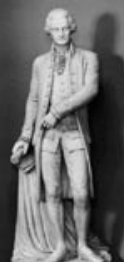In Balch Spring, Texas, senior citizens meeting at a community senior center were prohibited from praying over their meals. In Russellville, Kentucky, a library employee was barred from wearing her necklace because it had a small cross on it; and in Clymer, Pennsylvania, a school employee was suspended for wearing a necklace with a cross. Although states print hundreds of thousands of custom license plates plates ordered and purchased by individual citizens, Oregon refused to print “PRAY,” Virginia refused to print “GOD 4 US,” Vermont refused to print ROMANS5,” and Utah refused to print “THANK GOD,” claiming that such customized license plates violated the “separation of church and state.”
In cities in Texas, Indiana, Ohio, Georgia, and Nebraska, not only were citizens not permitted to hand out religious literature on public sidewalks or preach in public areas, but several were arrested for doing so. In Memphis, Tennessee, a library offered shelves for displaying community advertisements and announcements. When a local church placed a notification of its upcoming Christmas program and a small Nativity scene on the shelf, the library required the removal of Joseph, Mary, Jesus, and the Wise Men from the scene, leaving only the farm animals. In Eau Claire, Wisconsin, college students serving as residential assistants were prohibited from holding Bible studies in their own private dorm rooms, even though discussion groups on any other topic were permitted. In York, Pennsylvania, because a prosecuting attorney mentioned seven words from the Bible in the courtroom (a statement that lasted less than five seconds), a jury sentence was overturned for a man convicted of brutally clubbing to death a 71-year-old woman in order to steal her Social Security check. In the name of “separation of church and state,” courts and public officials have clearly imposed unreasonable restrictions on religious free speech across the general public sphere; and they have imposed even more egregious restrictions on students and education. For example: If students are given the latitude of creating artwork of their own choosing, it is unconstitutional for them to include a religious image in their artwork. JOKI v. BD. OF EDUC. OF THE SCHUYLERVILLE CENTRAL SCH. DIST., 1990; C. H. v. OLIVA, 2000; FLEMING v. JEFFERSON COUNTY SCH. DIST., 2002; PECK v. BALDWINSVILLE CENT.SCH. DIST., 2005 Student artwork containing religious symbols (such as a Bible or a cross) may be treated as gang symbols, profanity, and satanic signs. BANNON v. SCH. DIST. OF PALM BEACH COUNTY, 2004. David Barton - The wonder of worship. Apply it and you will never, ever be the same. How many of you have ever ridden a camel before? Will you please lift your hand?
0 Comments
Leave a Reply. |

 RSS Feed
RSS Feed